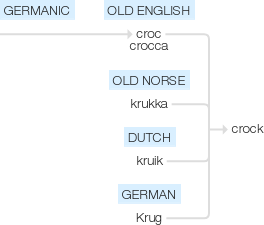Crock
Old English croc, crocca, of Germanic origin; related to Old Norse krukka and probably to Dutch kruik and German Krug .
wiktionary
From Middle English crok, crokke(“earthenware jar, pot, or other container; cauldron; belly, stomach”)[and other forms], from Old English crocc, crocca(“crock, pot, vessel”)[and other forms], [1] [2] from Proto-Germanic *krukkō, *krukkô(“vessel”), from Proto-Indo-European *growg-(“vessel”). The English word is cognate with Danish and Norwegian krukke(“jar”), Dutch kruik(“jar, jug”), regional German Kruke(“crock”), Icelandic krukka(“pot, jar”), Old English crōg, crōh(“crock, pitcher, vessel”). See also cruse.
Compare Welsh croeg(“cover”), Scots crochit(“covered”).
etymonline
crock (n.)
Middle English crokke, from Old English crocc, crocca "pot, earthen vessel, pitcher, or jar," from Proto-Germanic *krogu "pitcher, pot" (source also of Old Frisian krocha "pot," Old Saxon kruka, Middle Dutch cruke, Dutch kruik, Old High German kruog "pitcher," German Krug, Old Norse krukka "pot"). These all are perhaps from the same source as Middle Irish crocan "pot," Greek krossos "pitcher," Old Church Slavonic krugla "cup."
Specifically a receptacle for meal, butter, milk, etc., or in cooking; usually an earthen vessel but sometimes of brass or iron.
Used as an image of worthless rubbish since 19c., perhaps from the use of crockery as chamberpots. But there were other uses of crock, of uncertain relationship, such as "an old ewe" (1520s, Scottish), used contemptuously of debilitated or invalid persons (19c.). Also compare Middle English croke, crok "a hull, husk," figuratively "refuse," Low German krak "a thing of no value," colloquial English crock "soot, smut" (1650s).
